
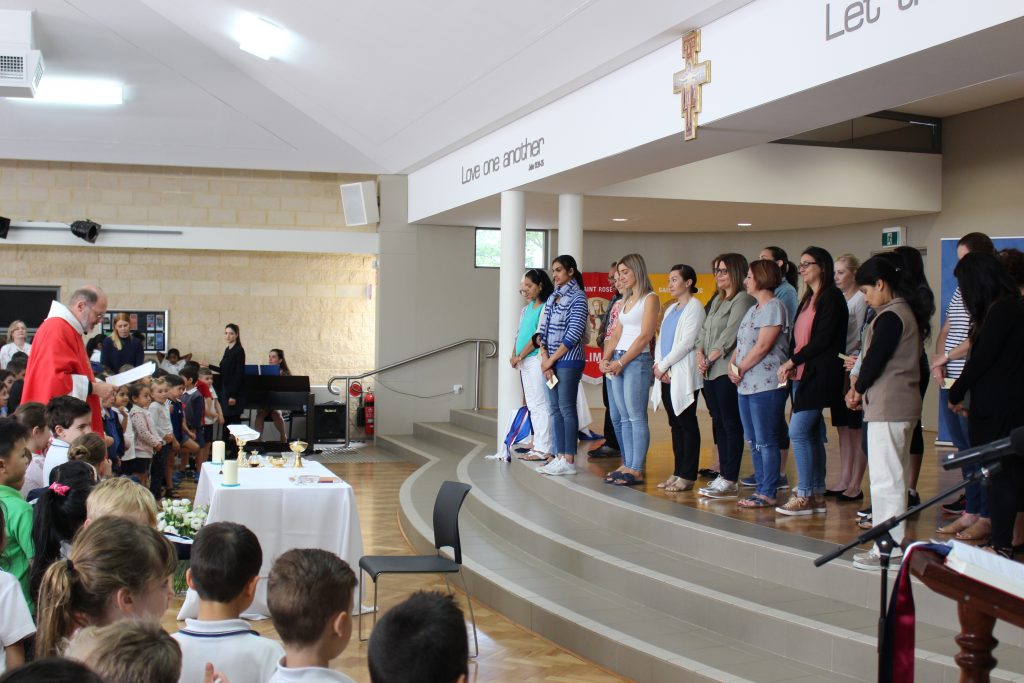
Principal’s Report – Issue 36
Dear Parents
 This article appeared in the Parish Bulletin one weekend an I thought it had some relevance to us all no matter what stage of our lives we are at. Please take the time to read over it and if you have the chance discuss the meaning with your children.
This article appeared in the Parish Bulletin one weekend an I thought it had some relevance to us all no matter what stage of our lives we are at. Please take the time to read over it and if you have the chance discuss the meaning with your children.
Be the Best You Can Be
An old Polish fable tells about a king who went into his garden one day to discover that all the plants and trees were dying. The king asked the oak tree what was wrong. The once majestic oak said that it was withering away in frustration because it was not as tall and straight as the pine tree.
The king then asked the pine tree why it was drooping so sadly, and the pine tree replied that it was sad because it could not bear grapes. The grape vine mourned that it was dying because it did not bear beautiful flowers like the tulips. And so, it went throughout the garden. But when the king came to a small daisy, he saw that the flower’s colours were bright, and its stem stood tall and straight.
Why was the daisy so healthy, the king asked the small plant?“I took it for granted, your majesty, that when you planted me here, you wanted a daisy in just this place.
So, I was determined that I would be the best I could be in this place.”
Connection
In this time and in this place, God has placed each one of us; God has given us certain colours and leaves and petals – skills and talents that we can contribute to make God’s entire garden a more joyful, hopeful and sacred place. The bri
ghtness of our colours, the greatness of our talents mean nothing; our determination to use them for the benefit of others, our humility in using our gifts to give thanks to their Giver, is the measure of our greatness in the reign of God.
Volunteer Mass and Morning Tea
Today was a special time to recognize all those who have volunteered in any way at Infant Jesus School this year. The morning commenced with a Celebration of the Eucharist led by Fr Greg. This was a very prayerful liturgy and gave us time to reflect on how we all need to be grateful for the gifts that we have been given by God and how we share these gifts to help others, as our volunteers have done throughout the year. The Mass was followed by a Morning Tea in the School Hall.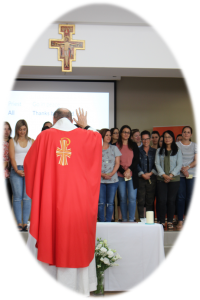
The partnership between home and school is vital. Volunteering is a beneficial way to strengthen this partnership as teachers and parents working together improves communication and assists with developing a greater understanding between parents and teachers. There is also a greater opportunity to share common beliefs, values and goals. All our children, therefore, feel more secure and purposeful and are supported to become confident, successful and lifelong learners.
We sincerely thank all those who have volunteered in any way – this includes assisting in classrooms, working in the canteen, helping on special days such as Infant Jesus Day, helping out at sporting events including the Swimming Carnival and the Cross Country and Athletics Carnivals. The time and generosity of our volunteers is impossible to measure – the success of some of these events relies quite heavily on their willingness to be available and to contribute where and when they are needed.
To all our volunteers we extend
a very sincere
THANK YOU
Kindergarten 2019
Last week we held an orientation session for all the families new to the Infant Jesus School Kindergarten classes for 2019. It was fantastic to see the enthusiasm and wonder of both the parents and the children as they participated in the activities that had been organised fo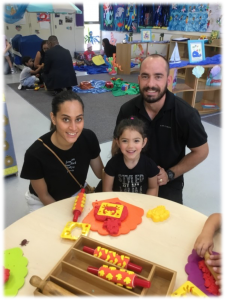 r the morning.
r the morning.
The Orientation was for both the children and the parents; this special time allowed the children to have a sense of what they would see and be able to do in their time at Kindergarten. This session was also to provide the children with some familiarity for when they come on the very first day of school next year. Both the children and the parents had an opportunity to play with some of the resources and equipment – in both the indoor and outdoor learning 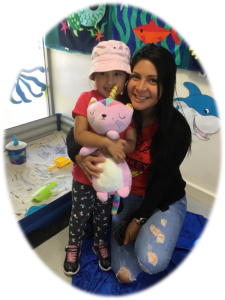 environments.
environments.
A short school tour was also part of the Orientation. Many of the parents were very impressed with what they were able to see on the ‘tour’. This included visits to some junior primary classrooms where teachers and children were involved in a variety of learning activities. They also saw the iLab, the Music Room and the Hall.
On Tuesday night these families returned for an Information Night. It was a special time to welcome all these families, as one group into the Infant Jesus School Community. During the session parents were invited to share their hopes and their dreams for their time at Infant Jesus School. Parents choose schools for a variety of reasons and it was fantastic to know that our Catholic faith, caring for, motivating and inspiring students to be successful learners, a safe environment and strong links between home and school were all important to both the parents and the school.
It has been a busy time – already, for these Kindergarten families – and they have much to look forward to in 2019 as their children commence their schooling at Infant Jesus School.
Annual Community Meeting
A reminder to all parents about the School Board and P&F Community Meeting to be held on Tuesday 27 November in the School Hall. Parents of the school community are strongly encouraged to attend this meeting as a sign of support for both of these parent representative bodies. School Boards are imperative to the correct functioning of all Catholic schools in WA. As a group, the Board has worked industriously to plan for the long-term future development of the school in the areas of maintenance, capital development and finance, with the vision of providing better facilities for the present and prospective students.
As stated previously, the P&F Association has also done a fantastic job in assisting the school to purchase additional resources over the years, as well as enhance the community spirit and support the school in planning and organising functions associated with the social, sporting, cultural, and educational life of the school community
We encourage all parents to consider assisting the school community by serving on one of these committees.
Year Six Graduation & Dinner Dance
Next Friday evening our Year Six students will celebrate their completion of primary school with a very special Dinner Dance to be hosted at the school by the staff and parents. Parents are invited to join the children at 8.30pm and share with their child the traditional parent/child dance. Please keep in mind the children want this special time from 6.30pm-8.30pm together, to enjoy each other’s company for one of the last times at Infant Jesus School.
We would especially like to thank Ardrian Gonsalves and her many helpers (Deanna Alvaro, Rosanna Monastra, Katy Petrolo, Nella Colonico, Stephanie Thuang, Maria Bellesini and Elisha Wallace) who have spent countless hours planning and preparing this special evening. We also would like to thank Carlo Petrolo who will be helping in the kitchen with catering until time for serving of food.
Graduation Assembly & Thanksgiving Mass – Friday 7 December 2018
On Friday, 7 December the Year Six students will celebrate the end of their primary school education with a Thanksgiving Mass and an Assembly. The Assembly will commence at 8.45am and all students from Year One to Year Six will be attending. This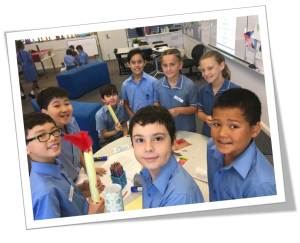 is a formal gathering of the school community where we honour our Year Six children and wish them well for the future. At the Assembly, each Year Six child will be presented with their graduation certificate and be given the opportunity to be with the community for one last time. During the Assembly staff and families leaving the school at the conclusion of the 2018 school year are also recognised and acknowledged.
is a formal gathering of the school community where we honour our Year Six children and wish them well for the future. At the Assembly, each Year Six child will be presented with their graduation certificate and be given the opportunity to be with the community for one last time. During the Assembly staff and families leaving the school at the conclusion of the 2018 school year are also recognised and acknowledged.
At the conclusion of the Assembly the Year Six children will join their parents for Morning Tea in the School Hall before the Thanksgiving Mass.
The Thanksgiving Mass will commence at 11.00am in the Infant Jesus Parish Church. This is a very significant occasion for the Year Six students and we invite everyone in the school community to not only keep our Year Six students in their prayers, but our entire Infant Jesus School community as they begin their Christmas vacation.
From My Readings This Week…
Don’t Let a Sibling Corner a Market
Michael Grose
Some kids will define themselves with a word or two. “I’m the smart/funny/dumb kid in the family.” So, when they are told by siblings that they are smart/dumb/cute etc, or just reminded through the way they are treated (e.g. by giving responsibility to responsible kids and withholding it from kids who struggle with it), they start to form their “I belong’ statement. That is “I belong in my family because I am the smart kid/the problem child/the helpful child”.
The trick to parenting is such kids is not to let them corner the market on any personality trait, characteristic or role in a family.
An eight-year-old once described himself to me using one word. “Dumb!”? Actually, he book-ended that with some other words. He said, “I’m the dumb one in my family.” He’d always been told in subtle ways by his parents that he didn’t quite measure u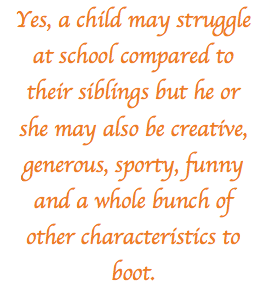 p and was constantly reminded by his siblings how he was struggling with school. His elder brother felt he was better at most things at his age. His younger sister was starting to overtake him in the academic stakes. Her success was a reminder that he was ‘dumb’. Never mind that her gender gave her a head-start.
p and was constantly reminded by his siblings how he was struggling with school. His elder brother felt he was better at most things at his age. His younger sister was starting to overtake him in the academic stakes. Her success was a reminder that he was ‘dumb’. Never mind that her gender gave her a head-start.
Many children fall into the habit of cornering the market on one attribute or characteristic. “I’m the smart/dumb/cute/funny/favoured, sporty/spoilt kid in the family!”
Of course, children a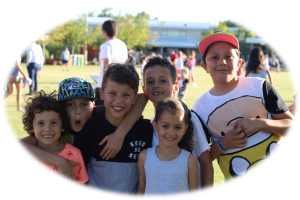 re the sum of many parts, but their view of the world is very subjective. Children are good observers, but lousy interpreters of what others say.
re the sum of many parts, but their view of the world is very subjective. Children are good observers, but lousy interpreters of what others say.
All this happens in latency – the period of life before adolescence. It’s a time when kids are trying work out who they are and how they fit into their various groups. And of course, since their family is the first group they belong to, their place in their family also shapes their role in other groups. That’s why kids’ birth order and family constellation is so powerful. The trick is to not let kids corner the market on any one attribute.
Yes, a child may struggle at school compared to their siblings but he or she may also be creative, generous, sporty, funny and a whole bunch of other characteristics to boot.
Just how you get these notions across to kids is a parenting challenge. Start by not labelling any sibling as the ‘funny’ or ‘smart’ one, or the family clown! Then:
Treat kids uniquely, not equally
Many parents make the mistake of treating siblings equally. You can’t! Instead treat them in their own special way. Respond to their strengths, and don’t get sucked into focusing on what they can’t do. See them as whole people, not as labels or as kids playing roles. This holds true for special needs kids. See past the disorder to focus on the whole child and all their abilities, interests and quirks.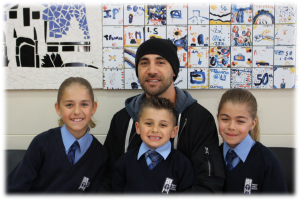
Treat them as you want them to be, not as they are
Want a child to be responsible? Then give them responsibility (for their toys, packing their own school lunch, feeding the pet) and allow them to mess up and experience what not being responsible feels like. It should feel rotten because they have let others down. ‘I-messages’ work well at these times, as they are non-judgemental. Look ahead realistically at how you want your kids to be (friendly, smart, studious, etc.) and start seeing them through that lens.
You are not wonderful or woeful
Being the wonderful kid is a lousy role to play. It can be so limiting and exhausting to have to constantly live up to the expectations of parents. But that is exactly what wonderful kids often do. Putting kids on the wonderful/great/the good one pedestal is as bad as putting kids in the woeful basket.
Don’t let kids corner the market on one attribute or characteristic
If you have a child who defines him or herself in one or two words, then help them scratch the surface to reveal the full splendour of the gem that lies beneath their single-minded exterior.
2019 Term Dates
Please find below the listed Term Dates for Infant Jesus School for 2019. Included in these are the scheduled Pupil Free Days for the year. Please note that the finishing date is yet to be confirmed, but at this stage is the 13 December.
Term 1 Monday 4 February – Friday 12 April
Term 2 Tuesday 30 April – Friday 5 July
Term 3 Tuesday 23 July – Thursday 26 September
Term 4 Tuesday 15 October – Friday 13 December (To be confirmed)
Pupil Free Days 2019
Monday 29 April
Tuesday 4 June
Monday 22 July
Friday 27 September
Monday 14 October
Prayer for the Week
God,
Open my eyes so I may see
And feel your presence close to me.
Give me strength for my stumbling feet
As I battle the crowd on life’s busy street,
And widen the visions of my unseeing eyes
So in passing faces I’ll recognize
Not a stranger, unloved and unknown.
But a friend with a heart that is much like my own.
Give me perception to make me aware
That scattered profusely on life’s thoroughfare
Are the best gifts of God that we daily pass by
As we look at the world with an unseeing eye.
Amen
Did you Know?
- No word in the English language rhymes with Month
- Numbers ending in 1, 2 or 5 are the only numbers always divisible by the number they end in.
- You can spell “typewriter” with the first row of letters on a keyboard
- Oranges, lemons, watermelons and tomatoes are berries
Thought for the Week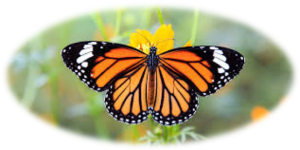
Happiness is like a butterfly which when pursued, is always beyond our grasp.
But if you sit quietly, will come and rest gently with you.
Have a Great Week

Paul Hille
Principal
WESTERN AUSTRALIAN BISHOPS DEFEND LIFE
A Message from the Deputy Director of Catholic Education Western Australia
The seven Bishops of Western Australia, Archbishop Timothy Costelloe and Auxiliary Bishop Donald Sproxton of Perth, Bishop Christopher Saunders of Broome, Bishop Michael Morrissey of Geraldton, Bishop Gerard Holohan of Bunbury, as well as Emeritus Archbishop Barry Hickey of Perth and Emeritus Bishop Justin Bianchini of Geraldton have called on the Western Australian Government to take the ethical road to better and more accessible end-of-life care, and not the easy path of voluntary assisted suicide.
The Bishops have released a statement in which they write extensively about the current debate of doctor-assisted suicide and euthanasia in Western Australia. Voluntary assisted suicide, the bishops say, does not take suffering away except by taking the suffering person away.
We have been instructed to circulate this statement to all in Catholic school communities so that there is a better understanding of the issues surrounding this critical and complex question of ethically and socially right ways of supporting end of life care.
Below is the statement from the Bishops and also a reminder that materials and resources and ways of being engaged in the debate can be found on the website below that is managed by Rev Dr Joseph Parkinson STL PhD.
Date: 20 November 2018
With the current debate about doctor-assisted suicide and euthanasia in Western Australia, we can expect the challenge of how best to care for the chronically ill and dying to occupy us all over coming weeks and months.
The Catholic Church has provided public and private health services in WA for over 120 years, including acute health care, aged care, disability and social support services. As one of the largest contributors to health care in this State, we strive to make authentic human compassion an absolute goal and hallmark of the care we offer.
Compassion is the ability to accompany a person caringly through their experience of pain and suffering. Compassion challenges us to become more humane and caring people. Indeed, our claim to provide ‘excellence in care’ can be measured in the commitment of our many dedicated caregivers who offer every patient, as death approaches, an affirming, enriching and peaceful natural end to their mortal life. We will always accompany, and never abandon, anyone who comes into our care.
A Parliamentary Joint Select Committee recently delivered 24 recommendations on end-of- life care in a Report entitled “My Life, My Choice”. Most of the report deals with decision- making in end-of-life care, and with palliative and comfort care for the dying. The last six recommendations propose legalising ‘voluntary assisted dying’ in this State.
The term ‘voluntary assisted dying’ embraces both doctor-assisted suicide (which requires authorising a medical professional to supply lethal means so that a person can end their own life) and euthanasia (when the doctor uses lethal means to end the person’s life directly). In this Pastoral Letter we use the committee’s own term to capture both of these.
Voluntary assisted dying in either form represents a radical breach in the universal prohibition on one person killing another. This prohibition sits at the heart of every civilized society. The right to life is the ‘sine qua non’ of all human rights: to risk or relativise it would be to undermine the foundation of every other right we enjoy.
In many respects “My Life, My Choice” is an excellent report. It clearly identifies factors limiting wider uptake of Advance Health Directives and Enduring Powers of Guardianship, which are statutory instruments intended to assist health care decision-making for people who are temporarily or permanently deprived of the power to decide for themselves. It makes important recommendations to improve the way these instruments can offer greater peace of mind to people at risk of losing decision-making capacity through illness, trauma, or dementia. The Report also offers insightful analysis of some serious challenges to better access to, and delivery of, palliative and comfort care at the end of life especially in country and remote Western Australia. Palliative care aims to offer people with life-limiting illness their best opportunity to live as well as possible for as long as their condition allows.
Modern medicine has made it possible for many of us to live longer, but that often means our end-of-life journey may also be longer and potentially with more suffering, which on rare occasions can be extremely difficult to relieve.
We acknowledge this dilemma, and we know how profoundly it can affect not only the patient but also their family and friends. And we appreciate that some individuals honestly feel, in light of their terrible experience of pain and distress, that they would rather die than endure another moment of torment.
These are critical and complex questions for our whole society to address very seriously, but voluntary assisted dying is not the right answer.
Voluntary assisted dying does not take suffering away except by taking the suffering person away. It cannot and does not address the deepest human needs of the one who suffers, or the depth and breadth of that profoundly distressing human experience. We believe that even creating an option for voluntary assisted dying risks encouraging a view that the real aim of end-of-life care is to deal with a set of physical symptoms, when we should always seek to provide care for the whole human person in all of our relational, emotional, intellectual, and spiritual dimensions.
While we understand that some individuals would like the option of voluntary assisted dying, we believe it is not in our best social interests for our laws to allow it.
The title of the Committee report “My Life, My Choice” reflects the modern myth that each one of us should have completely autonomous control over all the key moments in our lives. But the reality is, none of us is so individual that we don’t need others to flourish at every moment, whether in life or in death or at any point in between.
Voluntary assisted dying is never a purely individual choice: it is always a social choice that requires and demands other people to cooperate. It always affects other people. Every decision we make, no matter how private it may appear to be, does in fact impact on others precisely because we are not isolated individuals but people who live in a family, a community, a society. The myth of “it’s my life, it’s my choice” completely ignores this reality.
Socially speaking, a far better approach would begin with acknowledging the great richness and complexity of the whole life cycle, including illness, suffering and death, and then learning how to talk about these more naturally. We would come to see these not as events to be avoided at all costs but as inevitable moments in life which all of us should expect to experience at some time.
In any event, and despite assumptions implicit in the report, no government can guarantee that once legislated, these laws will never be expanded to embrace categories of people beyond the imminently dying. If one government today claims it can legislate an initial breach in the universal prohibition on killing, it would have to acknowledge the capacity of another government tomorrow to legislate further breaches. This kind of ‘legislated bracket creep’ has occurred elsewhere. ii and we already know that pressure will certainly be brought to bear on a future WA government to broaden these laws, as local advocates for voluntary assisted dying have clearly stated. iii We also know that where it has been introduced, voluntary assisted dying changes the ethos of medical practice. iv This is inevitable whenever the ‘my life, my choice’ principle is given unqualified precedence over established professional standards of medical knowledge and clinical experience.
Voluntary assisted dying confronts doctors, nurses and other health professionals with values and attitudes which violate fundamental convictions about the nature of human life that ground the obligations of their own professions.
Against the threat of voluntary assisted dying we call on all medical professionals to resist pressure to transform their professions into services that simply deliver whatever a patient wants. Genuine medical need is always the best driver of excellent medical care.
We urge government and health care providers, including Catholic providers, to work together in order to break through any systemic or organisational factors impeding patient access to better palliative and end of life care.
Catholic health, aged care, disability and social service providers in this State are committed to providing truly compassionate care of the highest quality. We will always accompany the patient on their end-of-life journey, and never abandon them. We will not provide death, or support the provision of death, as a treatment for suffering.
We know that we must neither over treat nor under treat, but always offer only treatment that is beneficial and bearable. We confirm that any medical treatment a competent patient believes will not be therapeutically beneficial or finds to be unreasonably burdensome can be refused with a clear conscience. Such choices are fully consistent with both the patient’s legal rights and our own ethical standards.
Rather than legislate to allow voluntary assisted dying, we must use all the means of treatment we now have available in more creative and coordinated ways. We need to invest heavily in research into more effective ways of managing chronic pain, suffering and disability. And we have to work harder to create new models of care across the whole continuum of patient need.
Voluntary assisted dying will not provide any West Australian with a reasonable solution to their end-of-life needs. Better advance health care planning, more workable statutory instruments, and a substantial investment in making excellent palliative care in all its forms more accessible to all West Australians, will bring benefit to everyone.
As it seeks to address these critical questions, we call on Government to take the ethically and socially right road toward better and more accessible end-of-life care, and not to take the easy road of voluntary assisted dying.
1. i Information about Advance Health Directives and Enduring Powers of Guardianship can be found on the website of the Office of the Public Advocate: https://www.publicadvocate.wa.gov.au/default.aspx
2. ii The Report acknowledges this in the case of Belgium (at 5.84). iii Citing Murray Hindle, president of Death with Dignity WA, in a forum sponsored by Palliative Care Australia on 28 August 2018. iv See https://www.ncbi.nlm.nih.gov/pubmed/16676767
#ExpectGreatThings


© Infant Jesus School 2017
17 Smith St, Morley WA 6062
Tel: (08) 9276 1769 | Fax: (08) 9276 2998
Website by Chameleon Logic








